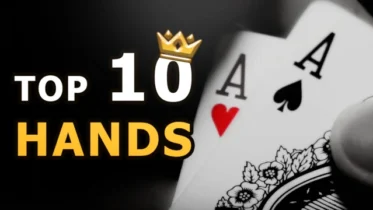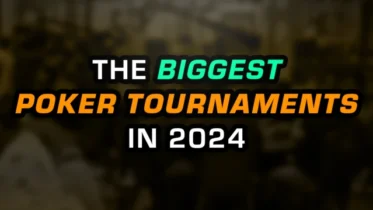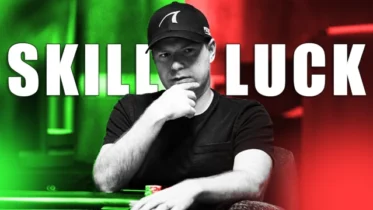“Hold it, Lee – how can I make a mistake on a street that doesn’t even exist?”
Au contraire, my poker buddy. Firstly, ever since there has been seven-card stud, there have been sixth (and seventh) streets. But neither you nor I want me to write about seven-card stud strategy, so we can set that aside.
However, thanks to the inimitable Tommy Angelo, and his equally inimitable book, Elements of Poker, flop games have had a sixth street since, well, at least 2007. When the betting stops, sixth street starts.
Here’s how it works: we’re on the river (aka “fifth street”). You bet, I call. You turn your hand up, I say, “Good hand,” and muck my cards.
Boom, we’re on sixth street. Unlike previous streets in the game, there is no specified order of action by any of the players. Any player can take a sixth street action at any time. Unfortunately, this just gives us all many opportunities to make errors.
“That was when I knew I had made my first mistake…”
–Lyle Lovett
Showing your cards when a better hand has been tabled
In the example above, the moment you table the winning hand, I have an opportunity to make a classic sixth street error: showing my cards. You showed first – that’s how the game works. So if your hand beats mine, I can slide mine into the muck unseen, which is exactly how it should get there.
But I bet you occasionally show what you had, even after being shown the winning hand. Because… honestly, I don’t know why. To get pity from the table because your kicker was one pip too small? Seriously – pity at the poker table? Tell me another one.
Maybe you’re showing how light you called, to indicate you felt they were bluffing. Why are you telling them that? It’s not anybody’s business except yours why you decided to make a call. Anything you share beyond that is giving away free information.
We play a game of imperfect information – don’t perfect your opponents’ information.
Side note: if you’re new to the game, or are playing PLO, it’s fine to table cards you aren’t required to show. That way you can’t overlook the best hand. We’ve all done that at least once, and I’ve done it multiple times.
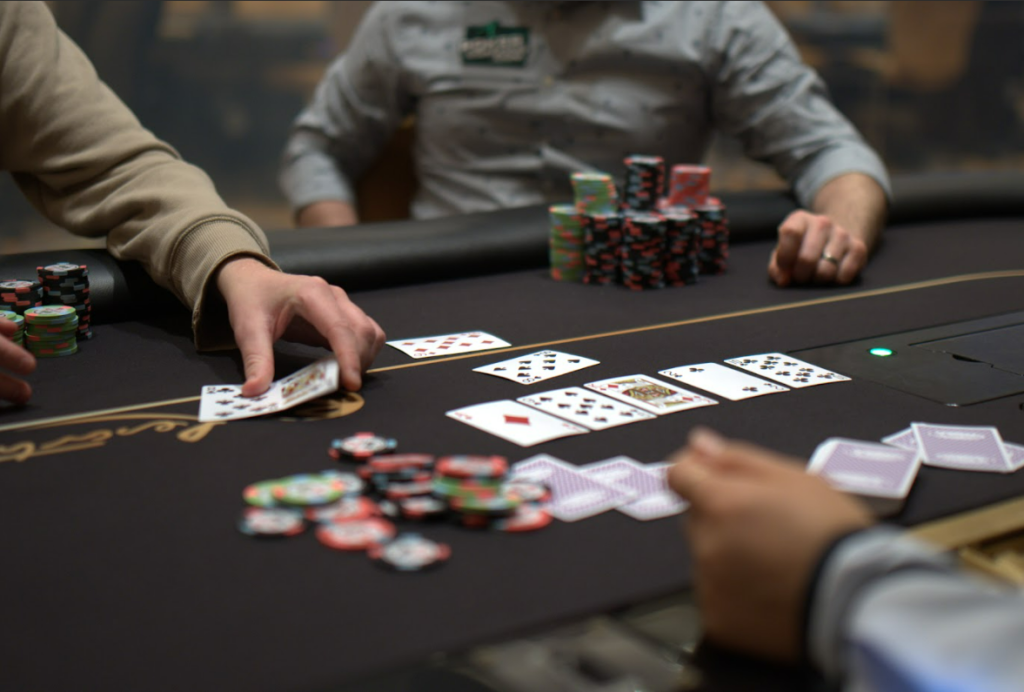
When your opponent shows the better hand, you are better off just mucking your cards.
Showing your cards as you fold
This error is perhaps more egregious, since it is usually used in circumstances where you’re folding a good hand. You 4-bet preflop with QQ, but your opponent 5-bet shoves on you. You fold your queens face-up to show them and/or the table and/or the cocktail server what a great player you are and how…
I’m sorry, I have no idea where I’m going with the sentence above, because I have no clue what you’re hoping to accomplish. Are you trying to show your opponent that they’re far too predictable, and that you know that your QQ is never good in that spot? Why in the world would you tell them that you’re that sure?
If you show your opponents that you’re capable of making big folds, they’ll give you ample opportunity to practice that skill.
“The rule is this: you spot a man’s tell, you don’t say a #$@&*#& word.”
–Mike McDermott
Mike was, of course, absolutely correct. If you know for a fact that your opponent always has KK or better, great – slide the queens into the muck face-down. And don’t say a word about why you did it.
Showing your cards when they fold
One of the true privileges of not being called is that you don’t have to show your cards. So bask in that privilege. Because I promise you, your opponents really wanna know if you had it or not. It’s eating at them. What could be better than leaving them dangling? If you show them that you had it, or didn’t, they know. They’re happy that they know. They’re settled and content, when you could have left them confused and angst-ridden.
Which one is better for your bottom line?
Also, it’s possible that you have a tell – perhaps involving Oreos – that your opponent has picked up. Maybe they don’t know what they should associate with that tell, but they know you’re doing something a little “off.” If you don’t show your cards, then they don’t know what the tell means. But if you show, then they do know what the tell means, and in the future, they’ll be able to know what you have. This is the worst thing imaginable.
Now, I know that some of you are going to draw up into a professorial tone, and say, “Well, I like to show them because then they get confused, and it makes them do what I want.” I grant that there are players who can do this. Who can, with perfectly curated frequencies, show cards that cause their opponents to zig when they should zag.
However, I’m not in that class of player, and I doubt you are either. I predict you’re doing it for any number of silly (mostly ego-driven) reasons, and the “I’m Johnny Moss’s grandson” narrative is just a cover for those silly reasons. But if you are Johnny Moss’s grandson, then good for you.

Read one of the highest regarded articles on the PokerCoaching.com blog: The Bankroll Bible
Not showing your cards in turn
You bet on the river, and your opponent calls. You were bluffing, so you know there’s no chance you’re good. You fire your cards into the muck face-down.
I get it. We are all trained from an early age not to lie. As we get older, we discover that everybody lies, and it’s merely a question of whether you get away with it. When you’re caught bluffing, not only are you violating the age-five rule of not lying, but you’re also violating the age-thirty-five rule of not getting caught. So there’s a powerful emotional inclination to just muck your cards unshown to mitigate the shame of getting caught bluffing.
Do not do muck face down. Instead, roll your cards in turn. There are important reasons to show your cards.
- You want to know what your opponent called with. If you muck face-down, you’ll never know what they had.
- You want your opponents to remember your bluffs. Turn your cards up shamelessly, and joke about it, if you like, by saying, “Queen-high any good?”
- Sometimes you’ll assume you’re beat and you’ll be wrong, because hero calls happen. Someone might call you with pocket fives, hoping you have pocket fours, and when you shamelessly roll your pocket sixes, they say, “That’s good.” Had you mucked face down, you would have lost that pot.
Discussing strategy at the table
Poker players love to talk about poker strategy. And that’s wonderful – it’s how we get better at the game. So here we are, a bunch of poker players sitting around a poker table, generating a constant stream of hands and situations. What a great opportunity to discuss strategy!
Only one problem: all those nice people at the table with you – they’re trying to take your money.
Look, I’m sure that when the WNBA coaches have their annual coaches conference, they all talk strategy. They can’t help it. These are women who have devoted their lives to basketball. So when the birds of this feather get together, they’re going to talk about little else.
But during the game, they share nothing with the opposing coach. In fact, they are doing everything they can to hide their tactics from the coach across the court.
As it should be with you. And I’ve got great news: we have the equivalent of the WNBA coaches conference, except that it goes 24/7, 365 days a year. It’s called the PokerCoaching Discord. You can come and discuss strategy all you wish. This will scratch your itch to discuss hands, spots, and strategy, with people who want to help you, rather than scratching it at the table with people who want to break you.
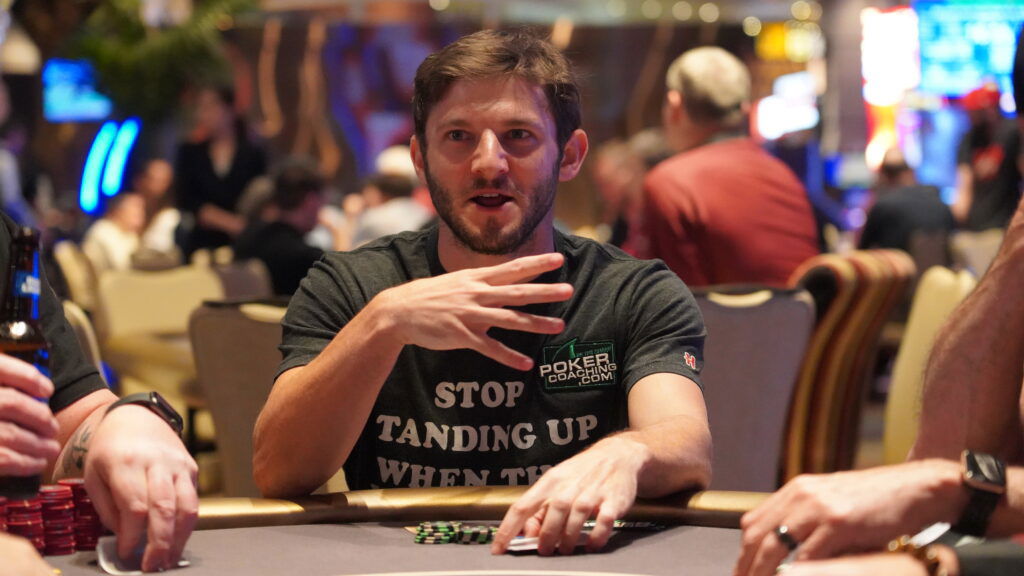
While poker may be a social game, it is in your best interest to not discuss strategy at the table.
Not watching and listening for information
Poker players are mostly terrible at sixth street play. They are fonts of information about how they play, what they’re thinking, all of it. So to exploit all those sixth street errors, all you have to do is pay attention.
Yet, few of us do that well. We’re too tied up reading our phones. Or, worse, discussing exactly why we put the #4 seat on a flush. You will be shocked at how much information is flowing around the table during sixth street. I’ll let Tommy Angelo sum it up:
“Sixth street is when players let their guard down, as if all of a sudden it’s safe to reveal classified secrets to the enemy. It’s like they don’t even know the war is still going on.”
–Tommy Angelo
During sixth street, keep your mouth shut, but your eyes and ears open.
Warning: During sixth street, when your opponents tell you what they had, don’t believe it. If they show their cards, that’s hard data that you can use. But if they say what they had, and don’t show, they’re often lying (just like you do). Look, during the hand, we’re all hiding information and lying to each other in every imaginable way. Why should it be any different on sixth street?
“If a player says what they had, but doesn’t show their cards, it’s all 🧚🌈🦄”
–Lee Jones
Sixth street can wind around town, and extend far into the future.
You play a big pot against one of the regulars at your casino. On the river, they bet, and you fold. A week later, you bump into each other at the casino’s sushi bar. They say, “Remember that big hand we played last week? The flop was K-T-6 two-tone and you folded on the river?”
Yes, you remember the hand, but you keep your mouth shut, and you let this future opponent and profit source reveal their soul. “I had AJs. I flopped a flush draw with the gut shot. I was thinking that because you didn’t 3-bet preflop that you had …”
🧚🌈🦄
When he’s done with sixth street, you ask, “How’s the sushi?”
You can gain huge edges on sixth street
If you play sixth street well, and your opponents play it poorly, as most poker players are wont to do, you can profit enormously. Just don’t make the sixth street mistakes they make:
- Showing your cards when a better hand has been tabled
- Showing your cards when they fold
- Not showing your cards when you’re caught bluffing
- Discussing strategy at the table
- Not watching and listening for information
Eyes and ears open, mouth shut. Easy game.

